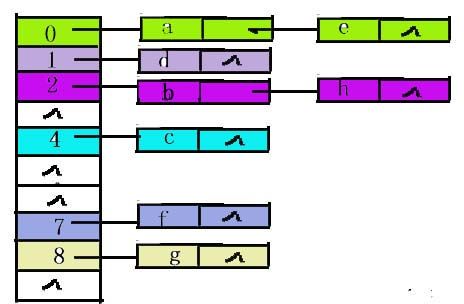哈希表的C实现(一)
哈希表(Hash table,也叫散列表),是根据关键码值(Key value)而直接进行访问的数据结构。也就是说,它通过把关键码值映射到表中一个位置来访问记录,以加快查找的速度。具体的介绍网上有很详细的描述,如闲聊哈希表 ,这里就不再累述了;
哈希表在像Java、C#等语言中是与生俱来的。可是在C的世界中,似乎只有自己动手,丰衣足食;在网上google了一把,大致有几个版本,我会一一来分析对比;
首先先来交代一下哈希表实现中需要注意的一些概念:
(主要参考:这里)
- 哈希函数
也叫散列函数,即:根据key,计算出key对应记录的储存位置
position = f(key)
散列函数满足以下的条件:
1、对输入值运算,得到一个固定长度的摘要(Hash value);
2、不同的输入值可能对应同样的输出值;
以下的函数都可以认为是一个散列函数:
f(x) = x mod 16; (1)
f(x) = (x2 + 10) * x; (2)
f(x) = (x | 0×0000FFFF) XOR (x >> 16); (3)
不过,仅仅满足上面这两条的函数,作为散列函数,还有不足的地方。我们还希望散列函数满足下面几点:
1、散列函数的输出值尽量接近均匀分布;
2、x的微小变化可以使f(x)发生非常大的变化,即所谓“雪崩效应”(Avalanche effect);
上面两点用数学语言表示,就是:
1, 输出值y的分布函数F(y)=y/m, m为散列函数的最大值。或记为y~U[0, m]
2,|df(x)/dx| >> 1;
从上面两点,大家看看,前面举例的三个散列函数,哪个更好呢?对了,是第三个:
f(x) = (x | 0×0000FFFF) XOR (x >> 16);
它很完美地满足“好的散列函数”的两个附加条件。
2、哈希冲突(Hash collision)
也就是两个不同输入产生了相同输出值的情况。首先,哈希冲突是无法避免的,因此,哈希算法的选择直接决定了哈希冲突发送的概率;同时必须要对哈希冲突进行处理,方法主要有以下几种:
1, 链地址法
链地址法:对Hash表中每个Hash值建立一个冲突表,即将冲突的几个记录以表的形式存储在其中
下面就来看看每种方法的具体实现吧:
链地址法:
举例说明: 设有 8 个元素 { a,b,c,d,e,f,g,h } ,采用某种哈希函数得到的地址分别为: {0 , 2 , 4 , 1 , 0 , 8 , 7 , 2} ,当哈希表长度为 10 时,采用链地址法解决冲突的哈希表如下图所示。
 图片及举例引自:这里
图片及举例引自:这里
1 #include "stdafx.h"
2 #include <string.h>
3 #include <stdio.h>
4 #include <stdlib.h>
5
6 typedef struct _node{
7 char *name;
8 char *desc;
9 struct _node *next;
10 }node;
11
12 #define HASHSIZE 101
13 static node* hashtab[HASHSIZE];
14
15 void inithashtab(){
16 int i;
17 for(i=0;i<HASHSIZE;i++)
18 hashtab[i]=NULL;
19 }
20
21 unsigned int hash(char *s){
22 unsigned int h=0;
23 for(;*s;s++)
24 h=*s+h*31;
25 return h%HASHSIZE;
26 }
27
28 node* lookup(char *n){
29 unsigned int hi=hash(n);
30 node* np=hashtab[hi];
31 for(;np!=NULL;np=np->next){
32 if(!strcmp(np->name,n))
33 return np;
34 }
35
36 return NULL;
37 }
38
39 char* m_strdup(char *o){
40 int l=strlen(o)+1;
41 char *ns=(char*)malloc(l*sizeof(char));
42 strcpy(ns,o);
43 if(ns==NULL)
44 return NULL;
45 else
46 return ns;
47 }
48
49 char* get(char* name){
50 node* n=lookup(name);
51 if(n==NULL)
52 return NULL;
53 else
54 return n->desc;
55 }
56
57 int install(char* name,char* desc){
58 unsigned int hi;
59 node* np;
60 if((np=lookup(name))==NULL){
61 hi=hash(name);
62 np=(node*)malloc(sizeof(node));
63 if(np==NULL)
64 return 0;
65 np->name=m_strdup(name);
66 if(np->name==NULL) return 0;
67 np->next=hashtab[hi];
68 hashtab[hi]=np;
69 }
70 else
71 free(np->desc);
72 np->desc=m_strdup(desc);
73 if(np->desc==NULL) return 0;
74
75 return 1;
76 }
77
78 /* A pretty useless but good debugging function,
79 which simply displays the hashtable in (key.value) pairs
80 */
81 void displaytable(){
82 int i;
83 node *t;
84 for(i=0;i<HASHSIZE;i++){
85 if(hashtab[i]==NULL)
86 printf("()");
87 else{
88 t=hashtab[i];
89 printf("(");
90 for(;t!=NULL;t=t->next)
91 printf("(%s.%s) ",t->name,t->desc);
92 printf(".)");
93 }
94 }
95 }
96
97 void cleanup(){
98 int i;
99 node *np,*t;
100 for(i=0;i<HASHSIZE;i++){
101 if(hashtab[i]!=NULL){
102 np=hashtab[i];
103 while(np!=NULL){
104 t=np->next;
105 free(np->name);
106 free(np->desc);
107 free(np);
108 np=t;
109 }
110 }
111 }
112 }
113
114 main(){
115 int i;
116 char* names[]={"name","address","phone","k101","k110"};
117 char* descs[]={"Sourav","Sinagor","26300788","Value1","Value2"};
118
119 inithashtab();
120 for(i=0;i<5;i++)
121 install(names[i],descs[i]);
122
123 printf("Done");
124 printf("If we didnt do anything wrong..""we should see %s",get("k110"));
125
126 install("phone","9433120451");
127
128 printf("Again if we go right, we have %s and %s",get("k101"),get("phone"));
129
130 /*displaytable();*/
131 cleanup();
132 return 0;
133 }
(未完待续)